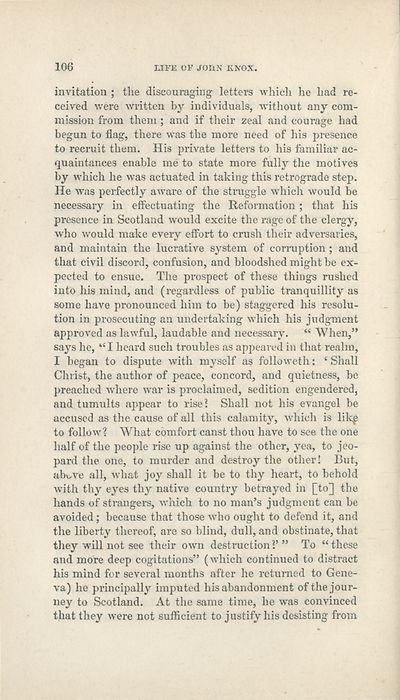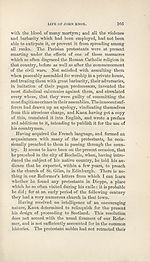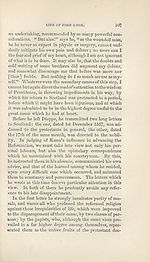Download files
Complete book:
Individual page:
Thumbnail gallery: Grid view | List view

106
LIFE OF JOHN KNOX.
invitation ; the discouraging letters which he had re¬
ceived were written by individuals, without any com¬
mission from them ; and if their zeal and courage had
begun to flag, there was the more need of his presence
to recruit them. His private letters to his familiar ac¬
quaintances enable me to state more fully the motives
by which he was actuated in taking this retrograde step.
He was perfectly aware of the struggle which would be
necessary in effectuating the Reformation ; that his
presence in Scotland would excite the rage of the clergy,
who would make every effort to crush their adversaries,
and maintain the lucrative system of corruption; and
that civil discord, confusion, and bloodshed might be ex¬
pected to ensue. The prospect of these things rushed
into his mind, and (regardless of public tranquillity as
some have pronounced him to be) staggered his resolu¬
tion in prosecuting an undertaking which his judgment
approved as lawful, laudable and necessary. “ When,”
says he, “I heard such troubles as appeared in that realm,
I began to dispute with myself as followeth: ‘ Shall
Christ, the author of peace, concord, and quietness, be
preached where war is proclaimed, sedition engendered,
and tumults appear to rise 2 Shall not his evangel be
accused as the cause of all this calamity, which is likp
to follow? What comfort canst thou have to see the one
half of the people rise up against the other, yea, to jeo¬
pard the one, to murder and destroy the other! But,
above all, what joy shall it be to thy heart, to behold
with thy eyes thy native country betrayed in [to] the
hands of strangers, which to no man’s judgment can be
avoided; because that those who ought to defend it, and
the liberty thereof, are so blind, dull, and obstinate, that
they will not see their own destruction 2’ ” To “ these
and more deep cogitations” (which continued to distract
his mind for several months after he returned to Gene¬
va) he principally imputed his abandonment of the jour¬
ney to Scotland. At the same time, he was convinced
that they were not sufficient to justify his desisting from
LIFE OF JOHN KNOX.
invitation ; the discouraging letters which he had re¬
ceived were written by individuals, without any com¬
mission from them ; and if their zeal and courage had
begun to flag, there was the more need of his presence
to recruit them. His private letters to his familiar ac¬
quaintances enable me to state more fully the motives
by which he was actuated in taking this retrograde step.
He was perfectly aware of the struggle which would be
necessary in effectuating the Reformation ; that his
presence in Scotland would excite the rage of the clergy,
who would make every effort to crush their adversaries,
and maintain the lucrative system of corruption; and
that civil discord, confusion, and bloodshed might be ex¬
pected to ensue. The prospect of these things rushed
into his mind, and (regardless of public tranquillity as
some have pronounced him to be) staggered his resolu¬
tion in prosecuting an undertaking which his judgment
approved as lawful, laudable and necessary. “ When,”
says he, “I heard such troubles as appeared in that realm,
I began to dispute with myself as followeth: ‘ Shall
Christ, the author of peace, concord, and quietness, be
preached where war is proclaimed, sedition engendered,
and tumults appear to rise 2 Shall not his evangel be
accused as the cause of all this calamity, which is likp
to follow? What comfort canst thou have to see the one
half of the people rise up against the other, yea, to jeo¬
pard the one, to murder and destroy the other! But,
above all, what joy shall it be to thy heart, to behold
with thy eyes thy native country betrayed in [to] the
hands of strangers, which to no man’s judgment can be
avoided; because that those who ought to defend it, and
the liberty thereof, are so blind, dull, and obstinate, that
they will not see their own destruction 2’ ” To “ these
and more deep cogitations” (which continued to distract
his mind for several months after he returned to Gene¬
va) he principally imputed his abandonment of the jour¬
ney to Scotland. At the same time, he was convinced
that they were not sufficient to justify his desisting from
Set display mode to:
![]() Universal Viewer |
Universal Viewer | ![]() Mirador |
Large image | Transcription
Mirador |
Large image | Transcription
| Antiquarian books of Scotland > Scotland/Scots > Life of John Knox ; and, The life of Alexander Henderson > (124) |
|---|
| Permanent URL | https://digital.nls.uk/131833792 |
|---|
| Description | Thousands of printed books from the Antiquarian Books of Scotland collection which dates from 1641 to the 1980s. The collection consists of 14,800 books which were published in Scotland or have a Scottish connection, e.g. through the author, printer or owner. Subjects covered include sport, education, diseases, adventure, occupations, Jacobites, politics and religion. Among the 29 languages represented are English, Gaelic, Italian, French, Russian and Swedish. |
|---|

